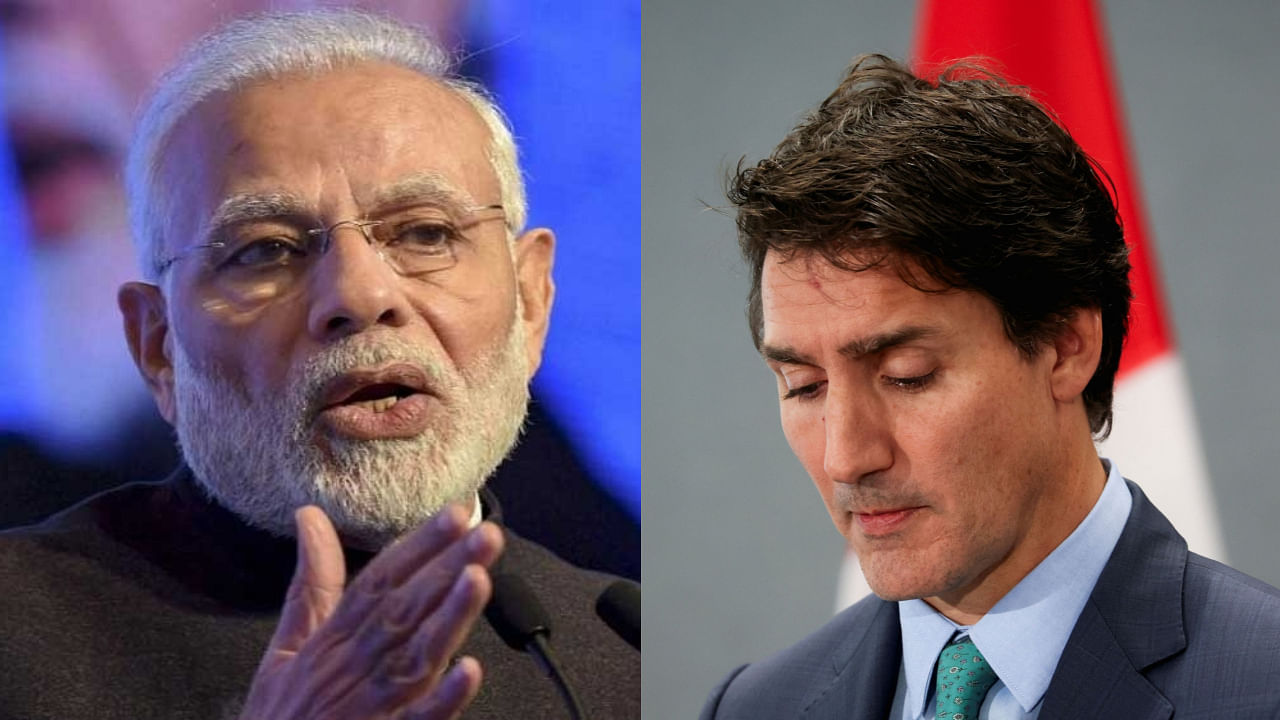
PM Narendra Modi and Canada's PM Justin Trudeau.
Credit: PTI and Reuters Photos
If a week is a long time in politics, as the saying goes, it’s an even longer time in geopolitics.
Six days after Canadian Prime Minister Justin Trudeau stood up in his country’s parliament to allege possible Indian involvement in the assassination of Sikh separatist Hardeep Singh Nijjar in June, New Delhi’s relations with the broader West are in the eye of the storm. Or, if you’re willing to forgive a bad play of words, Five Eyes.
On September 23, United States Ambassador to Canada David Cohen confirmed that information shared among the Five Eyes — an intelligence alliance of the US, Canada, the United Kingdom, Australia, and New Zealand — had played a role in Trudeau’s public accusation.
While the details of the intelligence shared with Canada by its Five Eyes partners are unknown, news reports suggest Ottawa intercepted communications between Indian diplomats that pointed to their involvement in Nijjar’s killing. Canada has not denied those news reports.
So, should India — which has denied any link to the June murder — be worried about its diplomatic standing? Irrespective of the facts of this case, does India need to learn lessons from this episode?
Some things are becoming clear even if the truth remains shrouded in the fog of allegations and counter-allegations.
First, the US, the UK and Canada’s other key allies are reluctant to burn bridges with India, which they see as a vital partner in balancing the rise of China. So, don’t expect a repeat of the West’s Cold War-era postures, when it alienated India — for instance, by cosying up to Pakistan — and pushed it into the Soviet Union’s arms.
Second, it would equally be naïve to expect that this time around, the US and its friends will pick India over Canada. The very architecture and credibility of the US-led alliance system hinges on members standing by each other on questions of national security, come what may!
It is now increasingly apparent that Canada’s Five Eyes partners aren’t just passively sticking by Ottawa, they are actively sharing intelligence that helps Trudeau strengthen his case against India.
This brings us to the third, and most important lesson from the past week. For all the public bonhomie that Western leaders demonstrate when meeting Indian counterparts or speaking of ties with New Delhi, they’re only too happy to snoop on their friends.
That’s no surprise: the Five Eyes alliance, in particular, is notorious for spying on friendly nations. In 2013, documents released by former US National Security Agency contractor Edward Snowden showed that alliance members snooped on each other’s citizens, and shared their findings among themselves. This helped in getting around the legal challenges that the governments would have faced in spying on their own nationals.
Leaked documents have shown that the US spied on at least three French Presidents, was carrying out surveillance of then German Chancellor Angela Merkel’s phone and email, and was also snooping on the communications of then Brazilian President Dilma Rousseff.
Despite this background, India has been tightening its intelligence-sharing mechanisms with the US and with its Western friends.
Diplomatic ties are built on principles of reciprocity. If the US and its partners aren’t transparent with India when it comes to intelligence, India must tread with extreme care while sharing the information it gleans from its myriad sources.
The Nijjar case is only the tip of the iceberg. Pro-Khalistan sentiments, like those espoused by Nijjar, have some support in the US, the UK, and Australia too. As with Canada, these countries have refused to meaningfully target those whom India has identified as national security threats.
As tensions mount over Trudeau’s claims, amid a drip-feed of details on the role of the Five Eyes partners in the episode, expect public opinion in the West to sour against New Delhi. That the US and its friends are responsible for a vast majority of extra-territorial, illegal assassinations, will be ignored. If India is increasingly viewed in the West as an undependable friend, New Delhi will find it tougher to get the West’s support on other issues, such as its balancing game with Russia and Ukraine, or its protectionist trade policies.
In some ways, Canada’s explosive allegations against India pose the biggest test for New Delhi’s ties with the West in a quarter of a century, since the 1998 Pokhran nuclear tests.
India handled that moment deftly, staying defiant publicly while engaging in backroom negotiations to defuse the crisis. It must do so again, quietly looking for solutions rather than taking steps that aggravate matters, such as the suspension of visas for Canadian citizens, which will mostly hurt members of the Indian diaspora.
Then, it must prepare for the future.
If there is any truth to the allegations of New Delhi’s involvement in Nijjar’s killing, the Five Eyes’ focus on Indian intelligence operations globally will intensify. India might not know which agents and diplomats have had their covers blown until it is too late, because their friends won’t tell them — even as they secretly confabulate among themselves.
Hugging world leaders and speaking in their parliaments might create feel-good moments for cameras, but the frost in India-Canada ties is a reminder that at the end of the day, international diplomacy is still very much a game of ‘gotcha’ — and India needs to get better at it.
(Charu Sudan Kasturi is a senior journalist whose work focuses on international relations, trade, energy, and technology. Twitter: @CharuKasturi.)
Disclaimer: The views expressed above are the author's own. They do not necessarily reflect the views of DH.